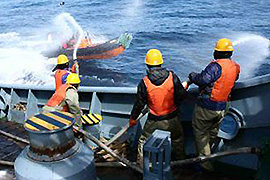Whale protesters call off campaign
Activists end protests in Antarctic Ocean citing dangerous clashes with Japan fleet.

Last week, the Steve Irwin collided with a Japanese whaling vessel as it attempted to prevent the Japanese fleet from continuing its hunt.
No one was injured, but both sides blamed each other, with Japan characterising it as “deliberate ramming”.
The company that operates Japan’s whaling ships blamed Sea Shepherd for the recent skirmishes, saying it was the protesters who escalated the attacks by ramming two Japanese vessels and pelting whalers with acid-filled glass bottles.
Japan – which has described the protesters as “terrorists” – plans to harvest up to 935 minke whales and 50 fin whales this season.
‘Terror attacks’
 |
| Sea Shepherd’s confrontational tactics have been criticised by other groups [AFP] |
“The escalating terror attacks will necessitate consideration of new security strategies to protect our ships and crews,” Kazuo Yamamura, president of Kyodo Senpaku Kaisha, the company that operates Japan’s whaling ships, said in a statement.
Japanese fisheries officials said they would stay on alert in case the Sea Shepherd crew returned.
“We don’t trust what they say. How can you be so sure if they won’t come back to attack our fleet?” Shigeki Takaya, a Fisheries Agency official in charge of whaling, told the Associated Press.
Takaya also accused the group of repeatedly making false accusations over the whalers’ actions in their past encounters.
“Use of violence should not be tolerated no matter what,” he said.
Loophole
Protesters aboard the Steve Irwin set off from Australia in early December for the Antarctic Ocean, chasing the whaling fleet for more than 3,200km across the dangerous waters at the bottom of the world.
Under a loophole in International Whaling Commission regulations, whales can be killed for research purposes, which is what Japan claims it is doing.
But opponents say the expeditions are a cover for commercial whaling, which was banned in 1986.
Watson said he said considered the anti-whaling campaign a success and vowed to return to the Antarctic next whaling season to disrupt the Japanese hunt.
“I think we did as much as we could,” he said.
“We shut them down for an entire month and a half. Our whole objective is to make them lose money and save as many whales as possible.”